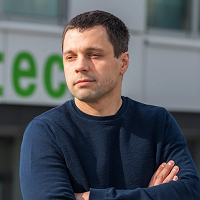Bio:
Evgeny Burnaev obtained his MSc in Applied Physics and Mathematics from the Moscow Institute of Physics and Technology in 2006. After successfully defending his PhD thesis in Foundations of Computer Science at the Institute for Information Transmission Problem RAS (IITP RAS) in 2008, he stayed with the Institute as a head of IITP Data Analysis and Predictive Modeling Lab. Since 2007 Evgeny carried out a number of successful industrial projects with Airbus, SAFT, IHI, and Sahara Force India Formula 1 team among others. The corresponding data analysis algorithms, developed by Evgeny and his scientific group, formed a core of the algorithmic software library for metamodeling and optimization. For his scientific achievements in the year 2017 he (jointly with Alexey Zaytsev and Maxim Panov) was honored with the Moscow Government Prize for Young Scientists in the category for the Transmission, Storage, Processing and Protection of Information.
Bio:
Alexander Bernstein received the Candidate of Sciences Degree in Physics and Mathematics from Steklov Mathematical Institute of USSR Academy of Sciences (Leningrad branch) in 1973 and the Doctor of Sciences degree in Physics and Mathematics in 1987 from the Department of Computational Mathematics and Cybernetics of Moscow State University. In 1982, the Higher Attestation Commission awarded him with the rank of Senior Research Scientist in the Theory of Probability and Mathematical Statistics. In the year of 1991, the Higher Attestation Commission awarded Alexander with the academic rank of Professor in the field of Intelligent Technologies and Systems.
In 2002, Alexander joined the Software Engineering Center of the Russian Academy of Sciences to lead the projects in developing data analysis and applied mathematics software. Prior to joining Skoltech, Alexander held the positions of Chief Researcher at the Institute for System Analysis RAS and Lead Scientist in the Data Analysis Research Lab at the Institute for Information Transmission Problems RAS. At the same time, he had part-time full professor positions at National Research University Higher School of Economics and Moscow Institute of Physics and technology.
Bio:
In 2012 Maxim Sharaev graduated from the Department of Physics at Lomonosov Moscow State University with a degree in Biochemical Physics, in 2016 he defended his Cand.Sc. dissertation on Functional Integration of Neuronal Populations in the Human Brain. Since 2009 he worked at RAS Institute of Higher Nervous Activity and Neurophysiology. Since 2014 Maxim worked in the National Research Center “Kurchatov Institute”, being involved in neuroimaging test data modelling projects (EEG, FMRT). Since 2018 Maxim has been a scientific team member at Skoltech CDISE. His major field of research: methods of neuroimaging and machine learning for diagnostics purposes, selection of medical treatment method and control over the progress of the state of patients with neurological and mental disorders.
Akram Farhadi, David Chen, Rozalina McCoy, Christopher Scott, John Miller, Celine Vachon and Che Ngufor
Chunxiu Shi, Jie Chen, Juan Chen and Zheng Zhang
Ruth Pfeiffer, Wei Wang and Efstathia Bura
Wei Li, Chaolu Feng, Dazhe Zhao, Yiqing Wang, Dongjie Wang and Xin Min
Al Amin Hosain, Panneer Selvam Santhalingam, Parth Pathak, Jana Kosecka and Huzefa Rangwala
Professor Andrzej Cichocki, A.Cichocki@skoltech.ru
Professor Alexander Bernstein, A.Bernstein@skoltech.ru
Leading researcher Maxim Sharaev, M.Sharaev@skoltech.ru
 《
《 《
《 《
《
